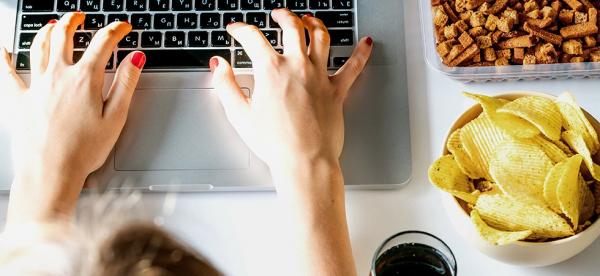
A lot of our clients have commented how lockdown has changed their food habits and relationship to food. Over the last few months, we may find we’ve been eating more, snacking more, and using food to make us feel good. We’re spending more time at home so there are more temptations, and the additional stress we’re facing from financial pressures, work, changes in our lifestyles, and family commitments may be testing our usually steadfast willpower.
So what can we do about it?
Our top tips include:
-
Make healthy home-made treats that nourish you and give you joy.
-
Create structure. Make a weekly meal plan to have a framework of what to eat rather than reaching for whatever is in the fridge/cupboard. You might not always stick to it, but at least you’ll have a road map of your meals and will be less likely to turn to takeaway or a frozen meal after a long day’s work.
-
Eat satiating foods, which you are less likely to overeat and are more likely to sustain and nourish you. We recommend eating wholefoods, which are organic and unprocessed, where possible. This includes a variety of fruits and vegetables, good quality fats (e.g. avocado, coconut oil, nut butters and olive oil), complex carbohydrates (such as quinoa, buckwheat and millet), and protein sources (legumes, beans, nuts, organic eggs, fish, grass fed meat and free range poultry).
-
Don’t have processed foods in the house. Due to the preservatives they contain, these foods won’t go off and will always be available to snack on. If you stick to wholefoods (such as fruit and vegetables) you’ll be more motivated to eat them before they go off and don’t go to waste.
-
Context is important. Sharing an Uber Eats meal with your family on a Saturday night is different to getting take away because you’re time poor, haven’t planned properly, and are stressed or emotional. Make the times you do get take away a special treat. Try not to make food decisions when stressed and feeling anxious or emotional (as you are more likely to make poor food choices).
-
Eat mindfully. Chew each mouthful of food 30 times. Notice the smell, taste and texture of your food while you’re eating. Don’t eat while distracted (e.g. watching tv, scrolling social media or reading) and aim to make mealtimes a family occasion.
-
Progress is incremental - small changes make a big difference. Make some simple swaps such as brown rice pasta or zucchini noodles instead of pasta, corn thins instead of corn chips, or dark chocolate (aim for 75% cacao or more) instead of milk chocolate. Gradually build better habits over time, rather than make lots of big changes all at once.
-
Be kind to yourself and stick to the 80/20 rule - aim to eat well 80% of the time. No-one is perfect! Despite trying your best, and having the best intentions to eat well, sometimes it won’t always go to plan. Every meal is an opportunity to start afresh, and remember that every moment you have the choice to be kind to yourself.
To book in with one of our naturopaths/nutritionists for more specific and personalised dietary and lifestyle advice, contact us via email (info@vitalchiwellness.com.au) or call 9894 0014.

